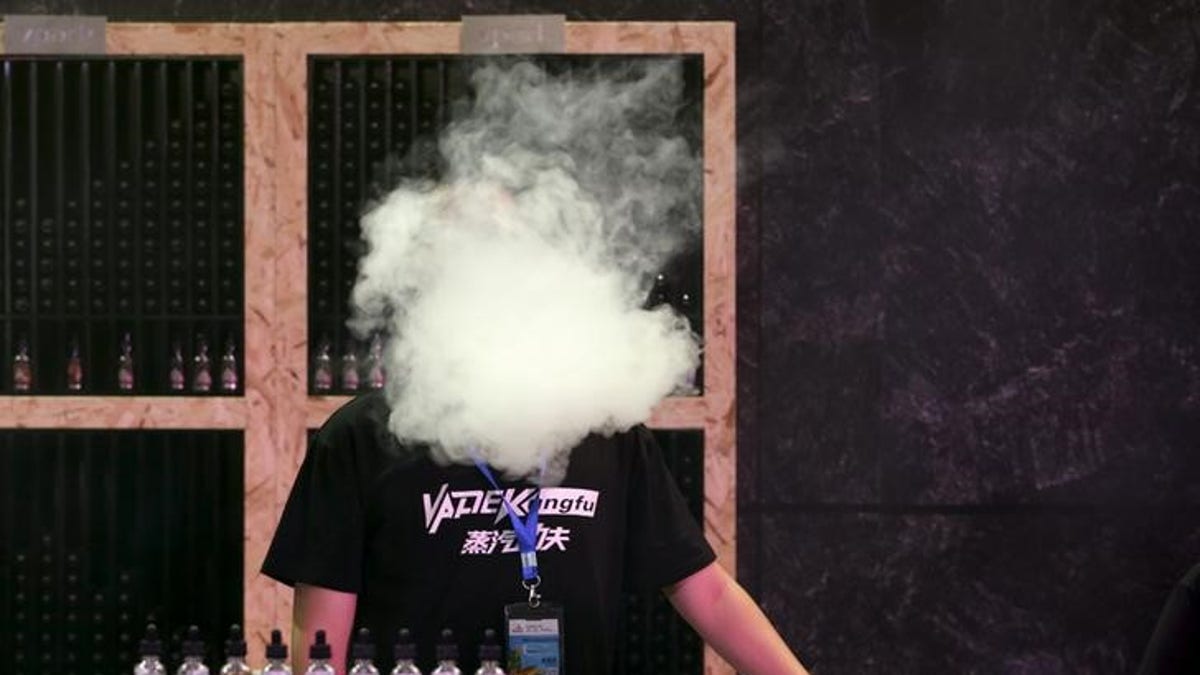
An exhibitor staff member uses an electronic cigarette at VAPE CHINA EXPO in Beijing (Copyright Reuters 2016)
Adolescents with a regular vaping habit aren't just more likely to take up smoking; they also have higher odds of developing a heavy cigarette habit, a U.S. study suggests.
The research, published in the Journal of the American Medical Association, calls into question whether e-cigarettes can be an effective cessation aid, said lead study author Adam Leventhal, director of the University of Southern California's Emotion and Addiction Laboratory in Los Angeles.
"Our most recent study is the first to show that teenagers who vape not only experiment with cigarettes, but are also more likely to become regular smokers," Leventhal said by email. "It is also the first time teenage vaping has been linked to heavier smoking patterns involving use of multiple cigarettes per day."
Big tobacco companies are all developing e-cigarettes. The battery-powered devices feature a glowing tip and a heating element that turns liquid nicotine and other flavorings into a cloud of vapor that users inhale.
E-cigarette use has surged among U.S. teens in recent years, surpassing traditional cigarettes to become the most popular tobacco product among young people, according to the Centers for Disease Control and Prevention. An estimated 3 million middle and high school students used the devices last year.
While tobacco control advocates fear e-cigarettes may give rise to a new generation of nicotine addicts who eventually transition to conventional cigarettes, some small studies suggest the devices might benefit the health of people who already smoke and switch to e-cigs, which are widely regarded as less dangerous.
"E-cigarettes do not prevent teens from advancing to smoking and may possibly do the opposite," Leventhal said.
For the current study, researchers examined data on 3,084 students at 10 Los Angeles high schools who participated in two surveys - one in the fall of tenth grade and another in the spring.
Overall, the prevalence of vaping and smoking was low.
At the start of the study, 2,075 students, or 67 percent, said they had never tried e-cigarettes. Another 730 participants, or 23 percent, had vaped in the past and 133 vaped on two or fewer days in the previous 30 days. Just 146 teens, or about 5 percent, said they were frequent e-cigarette users, meaning they vaped three or more days in the past month.
One in five teens who reported a regular vaping habit at the start of the study smoked traditional cigarettes at least three times a month by the end of the study period. Another 12 percent of routine vapers smoked at least one day a month.
By comparison, less than 1 percent of students who didn't try vaping reported smoking even one day a month at the end of the study.
Researchers also looked at how many cigarettes the teens smoked and found more frequent vaping associated with smoking two or more cigarettes on the days when teens chose to smoke.
Limitations of the study include its relatively brief follow-up period and its reliance on teens to accurately recall and report on their tobacco use, the authors note.
"One interpretation of these findings is that vaping provided a bridge to smoking - young people who may not have otherwise ended up smoking started with palatable, flavored e-cigarettes - and then after they became accustomed to e-cigarette use, many transitioned to traditional cigarette smoking," said Dr. Brian Primack, a researcher at the University of Pittsburgh who wasn't involved in the study.
"Another possibility is that the young people who ended up smoking by the end of the study were destined to ultimately smoke anyway," Primack added by email. "As evidence builds, there is more overall support for the former explanation."
Vaping might increase the odds of smoking by setting e-cigarette users on a path toward nicotine addiction, said Thomas Wills, a researcher at the University of Hawaii cancer Center in Honolulu who wasn't involved in the study.
E-cigarette users might also develop more positive associations with tobacco use than non-vapers, making them more willing to transition to traditional cigarettes, Wills said by email.
"There is no evidence that vaping helps protect teenagers from cigarette smoking; in fact all the evidence is the other way 'round," Wills concluded.




















